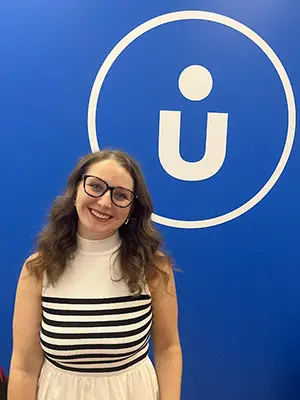Actuary Internships Prepare Math Majors for Work


Some mathematics majors at the University of Tennessee, Knoxville, are preparing for high-demand jobs in actuarial science through both the classroom and internships that offer real-world learning.
Ashley Holt (’25) and rising senior Michael Rice both completed 10-week paid summer internships in 2024 at Unum Group’s corporate headquarters in Chattanooga, Tennessee. Rice is headed back for another internship with Unum this summer, while Holt is preparing to become an employee with the insurance company.
The UT Department of Mathematics added an actuarial science concentration for math majors in fall 2024, preparing students to meet a growing demand in the workforce.
The US Bureau of Labor Statistics expects demand for actuaries to grow 22% in the decade leading up to 2033. In 2024, the median annual income for an actuary in the US was $125,770.
Career Exploration
Holt entered UT with plans to become an educator, starting as a mathematics major with a Vols Teach minor. She saw the wider possibilities for a career in the Introduction to Mathematical Sciences course. A speaker from Blue Cross Blue Shield talked to the students about being an actuary, a field that uses mathematics, statistics, and financial theory to analyze economic risk.
“I would love to teach after working in the corporate world, but right out of college I wanted a career that challenged my analytical skills in a new way,” Holt said. “The internship experience solidified my passion for actuarial science.”
Rice learned about the career through an Advanced Placement Statistics course in high school. “One of my favorite aspects of becoming an actuary is the extensive exam process,” he said. “Actuarial exams ensure that your education won’t end after college and provide a direct path for career growth.”
Holt will take the actuary Probability (P) Exam this summer, and after passing she’ll join Unum’s Actuarial Development Program.
Rice passed the P Exam while interning last year. UT’s Probability and Statistics course helped him prepare for the test and the work at Unum. “Since actuaries analyze the risk associated with insurance policies, it was important to understand how to talk about risk in mathematical terms,” he said.
With the new actuarial science concentration, the department offers more courses that will help students prepare for actuary exams.
Holt also found the problem-solving skills she honed as a Volunteer helpful in the workplace. “I was working in mostly software that I had never learned before, which was trying at times, but with my problem-solving skills from numerous math classes, I stayed motivated and was ultimately successful in my internship,” she said.
Benefits of an Internship
At Unum in 2024, Holt worked on a Group Pricing Team. “My main responsibility was to identify and solve discrepancies in their pricing financial data models through data reconciliation processes,” she said. “I worked in Tableau to enhance their dashboard interfaces and to optimize user experience and operational efficiency.”
Holt developed technical skills—such as coding in Excel, Tableau, and SQL—but that’s not all.
“I also strengthened my communication skills,” she said, “whether it was talking with interns or the chief actuary.”
The interns enjoyed multiple networking opportunities with other interns, the full-time employees, and executives.
“I took the time to set up networking meetings with all of the executives at Unum, including the chief actuary and other vice presidents,” Holt said. “At the end of the summer, I interviewed for my full-time position, which was my first-ever full-time job interview. This was a great experience as someone going into their senior year to get a taste of what that process looks like compared to interviewing for internship opportunities.”
During his first internship, Rice wrote a program to automate a yearly reporting process and analyzed trends in claims data to more accurately price insurance policies. He also was part of a group project researching technological innovations in the insurance industry. “We presented some of the theoretical applications of quantum computing in actuarial science,” he explained.
“On the technical side, I learned how to program in SQL and VBA, which are used for managing relational databases,” Rice said. “A lot of what I developed were soft skills, like teamwork and communication.”
That included the ability to document his work for future employees. “Even if I could get my program to work by the end of my internship, I still needed to make sure my team could also use it and make adjustments as needed come wintertime,” Rice said. “So, I thoroughly commented on each block of code, and left behind a detailed Q/A with questions I anticipated my team to have come wintertime. Usually in college courses it only matters that you can understand your own work, so I found the internship to be especially helpful in developing this skill.”
With a second internship before starting his senior year at UT, Rice expects to have an even better idea of what a full-time role as an actuary will be like.
By Amy Beth Miller